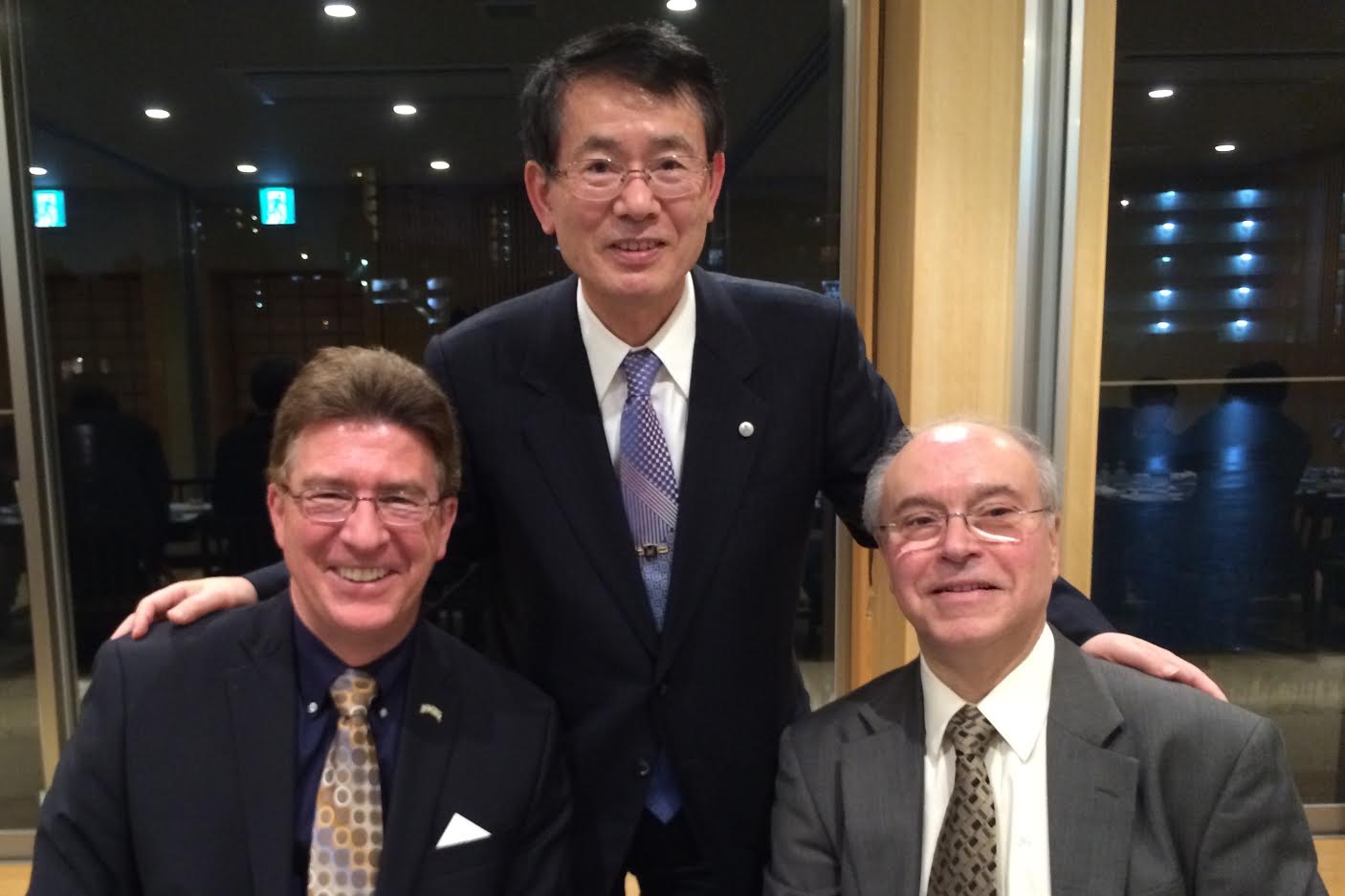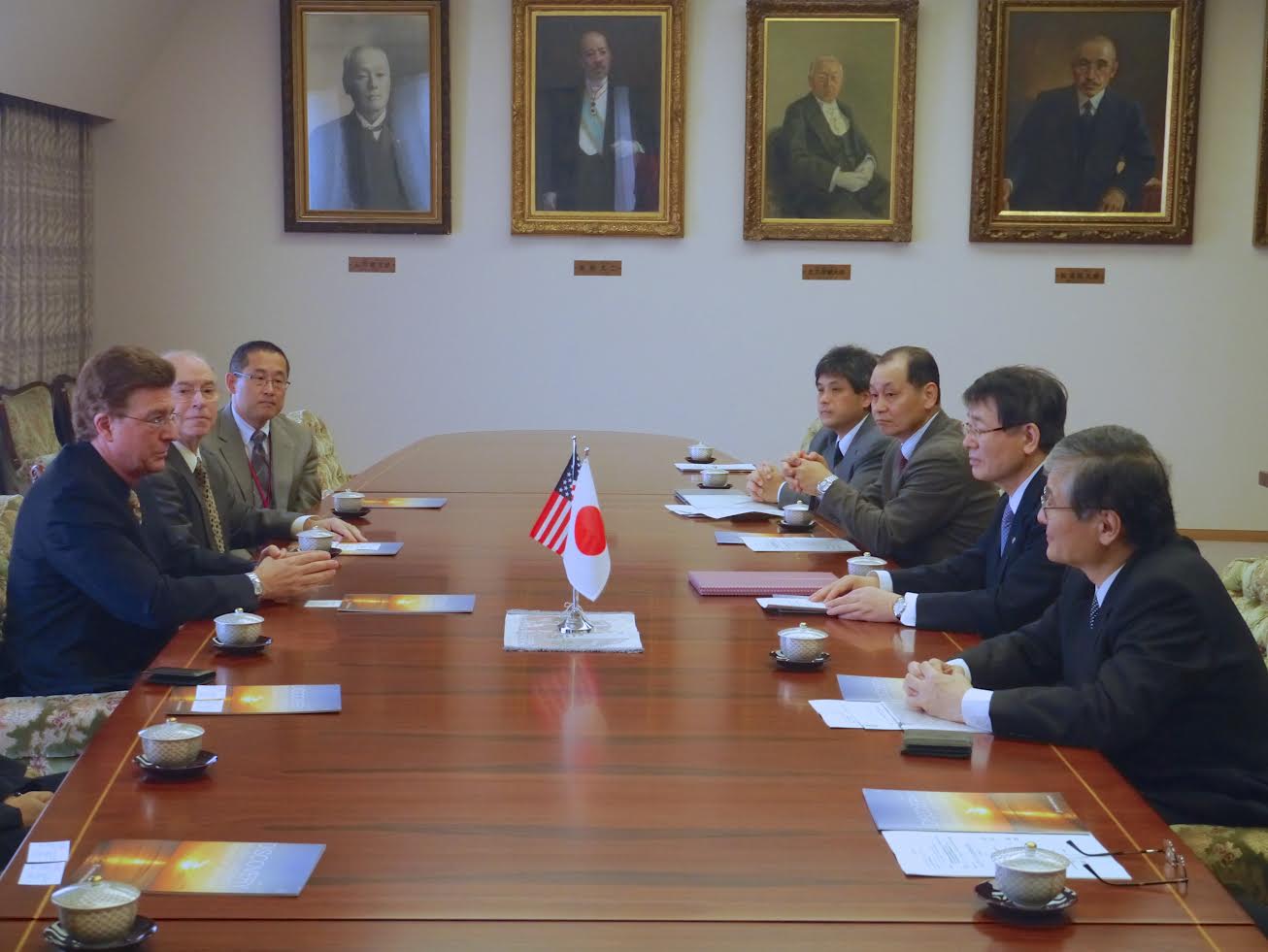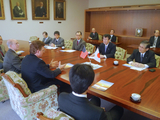UMBC visits Japan to kick off cybersecurity partnership
Steiner and Moreira represent UMBC at Kyushu University
By Sarah Hansen
UMBC Vice President for Research Karl V. Steiner and Vice Provost for Academic Affairs Antonio Moreira traveled to Fukuoka, Japan for the opening of Japan’s first academic Cybersecurity Center, housed at Kyushu University (KU). Steiner and Moreira both gave keynote addresses at the Cybersecurity Center Opening Ceremony and Cybersecurity Symposium January 21-23. The visit was a follow-up to a Memorandum of Understanding signed by both universities in June 2014 at UMBC that formalized an agreement to forge collaborations in research and education.
The partnership was initiated by KU. “They sought us out specifically around cybersecurity,” stated Moreira. KU is in the process of moving to a brand-new, high-tech campus, and is growing its cybersecurity programs. “As they are laying the foundation for what courses to give and what research to pursue, they were looking for a partner that had a track record and some experience,” added Moreira.
UMBC fit the bill. “UMBC has a very good reputation in cybersecurity, and Maryland is positioned as a hub of cybersecurity research,” Steiner said. Surrounded by government agencies and now with the creation of a new National Lab for Cybersecurity, “Within our strategic research goals, cybersecurity is clearly one of the main focal areas for our institution,” Steiner said.

From left to right: Steiner, Kyushu University President Chiharu Kubo, Moreira
KU has a great deal to offer, as well. While the primary focus of the visit was cybersecurity collaboration, “We saw a variety of other areas that KU is very strong in. We’re beginning to look at where are other opportunities?” Steiner said. The schools of design, medicine, and engineering were particularly impressive. “There were moments when they opened the door and we were impressed by the unique state-of-the-art equipment available in KU’s labs,” Steiner remarked. “It was eye-opening to see some of the research they were doing.”
By combining the expertise of the universities, “I think we can really benefit from each other,” Steiner said. But practicalities like the 14-hour time difference between Baltimore and Fukuoka pose a challenge. UMBC and KU are planning a live video-conference colloquium for Fall 2015. Getting classrooms full of students on both sides may require “some free sushi for dinner on our side and possibly coffee and donuts for breakfast on the other side, to put us all into a cross-cultural mindset,” said Steiner.

Representatives from UMBC and KU discuss plans for the institutions' partnership.
Overcoming challenges is worth it, though, to expand collaboration in this critical area and afford students opportunities for international interaction. “I think it is vital for our students to look beyond the borders of our country,” Steiner said. While faculty and student exchanges are a primary goal of the partnership, Steiner and Moreira are looking for ways that the UMBC-KU relationship can impact more than those few students who will travel to Japan or host Japanese students here. Steiner said, “A handful of faculty and students will visit and stay at the other institution and yes, their lives will be changed, but how can we make this a broader, more meaningful and sustainable relationship?” Moreira chimed in: “Such a sustained relationship between partners who share common interests will lead to meaningful advancements with global impact in research and education.”
These are the questions UMBC needs to answer as it continues to grow into a major research institution on the international stage. “It is an integral part of being a research-intensive university, to have relationships like this,” Steiner said. “Science cannot be local, science is global. Research is global.”
UMBC Vice President for Research Karl V. Steiner and Vice Provost for Academic Affairs Antonio Moreira traveled to Fukuoka, Japan for the opening of Japan’s first academic Cybersecurity Center, housed at Kyushu University (KU). Steiner and Moreira both gave keynote addresses at the Cybersecurity Center Opening Ceremony and Cybersecurity Symposium January 21-23. The visit was a follow-up to a Memorandum of Understanding signed by both universities in June 2014 at UMBC that formalized an agreement to forge collaborations in research and education.
The partnership was initiated by KU. “They sought us out specifically around cybersecurity,” stated Moreira. KU is in the process of moving to a brand-new, high-tech campus, and is growing its cybersecurity programs. “As they are laying the foundation for what courses to give and what research to pursue, they were looking for a partner that had a track record and some experience,” added Moreira.
UMBC fit the bill. “UMBC has a very good reputation in cybersecurity, and Maryland is positioned as a hub of cybersecurity research,” Steiner said. Surrounded by government agencies and now with the creation of a new National Lab for Cybersecurity, “Within our strategic research goals, cybersecurity is clearly one of the main focal areas for our institution,” Steiner said.
From left to right: Steiner, Kyushu University President Chiharu Kubo, Moreira
KU has a great deal to offer, as well. While the primary focus of the visit was cybersecurity collaboration, “We saw a variety of other areas that KU is very strong in. We’re beginning to look at where are other opportunities?” Steiner said. The schools of design, medicine, and engineering were particularly impressive. “There were moments when they opened the door and we were impressed by the unique state-of-the-art equipment available in KU’s labs,” Steiner remarked. “It was eye-opening to see some of the research they were doing.”
By combining the expertise of the universities, “I think we can really benefit from each other,” Steiner said. But practicalities like the 14-hour time difference between Baltimore and Fukuoka pose a challenge. UMBC and KU are planning a live video-conference colloquium for Fall 2015. Getting classrooms full of students on both sides may require “some free sushi for dinner on our side and possibly coffee and donuts for breakfast on the other side, to put us all into a cross-cultural mindset,” said Steiner.
Representatives from UMBC and KU discuss plans for the institutions' partnership.
Overcoming challenges is worth it, though, to expand collaboration in this critical area and afford students opportunities for international interaction. “I think it is vital for our students to look beyond the borders of our country,” Steiner said. While faculty and student exchanges are a primary goal of the partnership, Steiner and Moreira are looking for ways that the UMBC-KU relationship can impact more than those few students who will travel to Japan or host Japanese students here. Steiner said, “A handful of faculty and students will visit and stay at the other institution and yes, their lives will be changed, but how can we make this a broader, more meaningful and sustainable relationship?” Moreira chimed in: “Such a sustained relationship between partners who share common interests will lead to meaningful advancements with global impact in research and education.”
These are the questions UMBC needs to answer as it continues to grow into a major research institution on the international stage. “It is an integral part of being a research-intensive university, to have relationships like this,” Steiner said. “Science cannot be local, science is global. Research is global.”
Tags:
Posted: February 9, 2015, 3:26 PM
